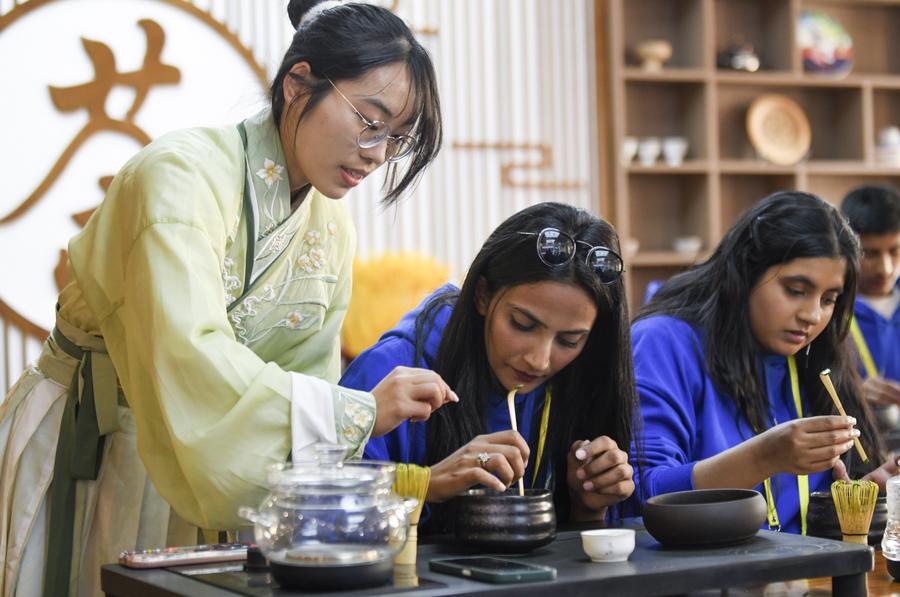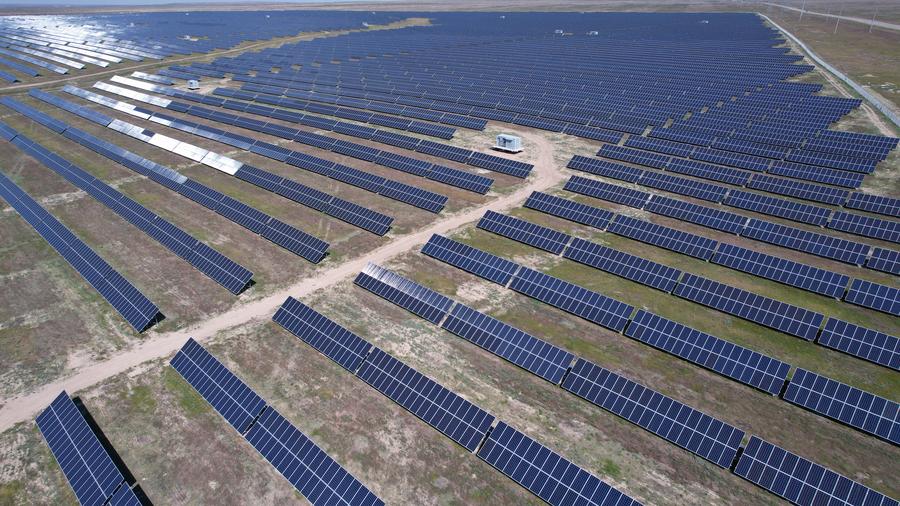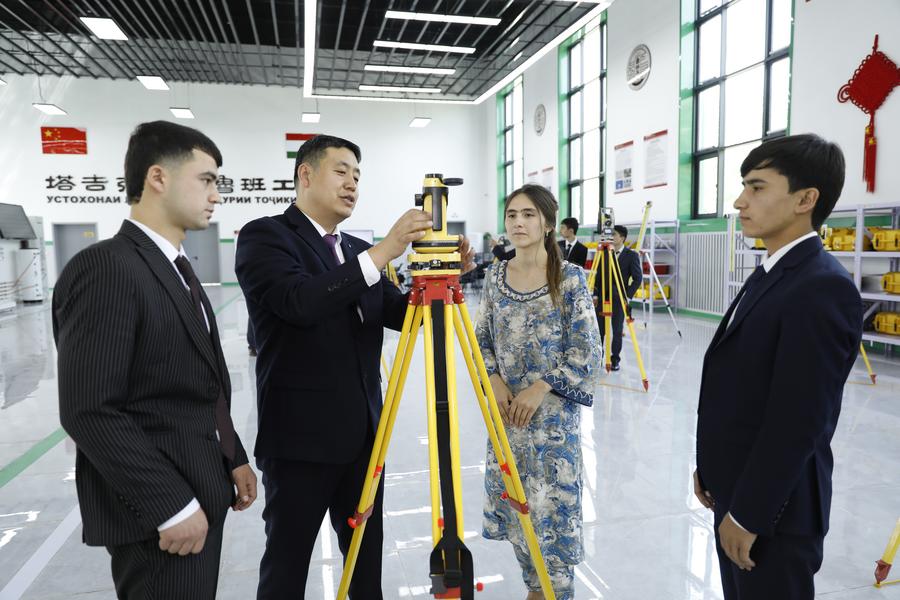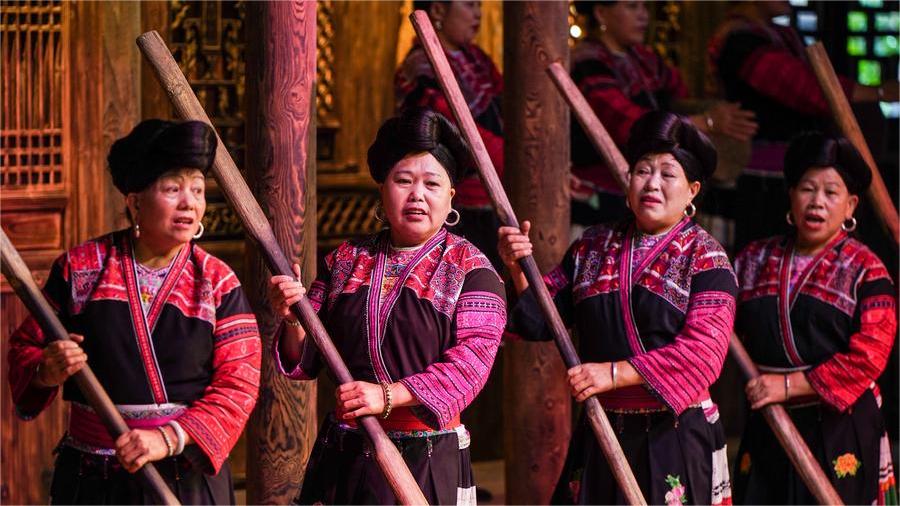Xi's visit to promote SCO cooperation, enhance China-Central Asia relations
BEIJING, July 2 (Xinhua) -- Chinese President Xi Jinping left Beijing on Tuesday for a summit of the Shanghai Cooperation Organization (SCO) and state visits to Kazakhstan and Tajikistan.
During the summit in the Kazakh capital of Astana, Xi will discuss with his SCO colleagues development blueprints and build up consensus on cooperation, which is poised to add new impetus to maintaining peace and prosperity on the Eurasian continent and beyond.
Countries on the vast Eurasian continent share a long history of exchanges, similar development tasks and a closely linked future. Xi's trip is expected to enhance China's cooperation with respective countries and help build a closer China-Central Asia community with a shared future.

Students learn tea art under the instruction of a student (L) from Xinjiang Normal University during the 2024 "Chinese Bridge" Spring Camp for students from SCO countries, in northwest China's Xinjiang Uygur Autonomous Region, April 15, 2024. (Xinhua/Wang Fei)
STRONGER TIES
In early June, Xi, along with Kyrgyz President Sadyr Japarov and Uzbek President Shavkat Mirziyoyev, applauded via video link the signing of an intergovernmental agreement on the China-Kyrgyzstan-Uzbekistan railway project.
The railway is a strategic project of connectivity between China and Central Asia that demonstrates their commitment to common development through cooperation under the Belt and Road Initiative (BRI).
The project is the latest example of the SCO family's cooperation and solidarity under the guidance of the "Shanghai Spirit."
The SCO was created 23 years ago with the "Shanghai Spirit" being its founding values, which champion mutual trust, mutual benefit, equality, consultation, respect for diversity of civilizations and pursuit of common development. Now, with nine member states, three observer states and 14 dialogue partners, it is the world's largest regional organization in terms of geographical scale and population.
Xi has attended every SCO head-of-state summit since 2013, including through live videoconferences during the COVID period, and shared his thoughts and proposals on building stronger SCO ties and promoting development.
Maintaining regional peace and security is the cornerstone of SCO cooperation. In recent years, SCO members have strengthened coordination in combating the "three evil forces" of terrorism, separatism and extremism, tackling drug trafficking, as well as safeguarding security in cyberspace and outer space.
A major driving force of the SCO's development is an orientation towards economic growth and practical cooperation.
The SCO has witnessed flourishing trade and investment cooperation among its members, with its share of global trade rising from 5.4 percent in 2001 to 17.5 percent in 2020, according to China's customs data.
People-to-people exchanges and mutual learning have become another key component of SCO cooperation through the years.
The bloc has witnessed burgeoning projects and activities, including the 2024 "Chinese Bridge" Spring Camp for students from SCO countries, which opened in Xinjiang in April, and the SCO agricultural universities alliance, which now fosters exchange of agricultural talents among over 20 universities from SCO member states.
Belt and Road cooperation between China and other countries has yielded fruitful results, promoting connectivity and socio-economic development of regional countries, former SCO Secretary-General Bolat Nurgaliyev said.
This is an epitome of the countries' cooperation based on equality and mutual benefit, and an important manifestation of the "Shanghai Spirit," he said.

An aerial drone photo taken on May 4, 2023 shows a view of the Kapshagay photovoltaic power station in Almaty, Kazakhstan. (Photo by Kalizhan Ospanov/Xinhua)
ANOTHER GOLDEN 30 YEARS
China and Kazakhstan share a border of roughly 1,700 km and a long history of friendly exchanges between their peoples. Xi used "good neighbors, good friends and good partners" to describe the profound friendship between the two countries.
The strategic guidance of the two countries' heads of state is a distinctive feature of China-Kazakhstan relations. During a state visit to Kazakhstan in September 2013, Xi proposed the Silk Road Economic Belt, an essential component of the BRI.
When Xi visited the Central Asian nation again in September 2022, he received the Order of the Golden Eagle, the highest honor of Kazakhstan, from President Kassym-Jomart Tokayev. The two leaders announced that China and Kazakhstan will work for building a community with a shared future defined by lasting friendship, a high degree of mutual trust and sharing weal and woe.
The year 2022 marked the 30th anniversary of bilateral ties. In 2023, Xi and Tokayev met twice in China. They pledged that the two countries are ready to create another 30 years of golden period for bilateral relations.
The two countries have built a full-fledged connectivity network to facilitate cross-border transport and trade. Thanks to cross-border railways, land border crossings and other logistic and trade facilities, China-Europe freight trains rumble like modern-day camel caravans, delivering products made in China to Central Asian and European countries, as well as wheat, fertilizers and other products from the landlocked country to China's Pacific harbors.
China was Kazakhstan's largest trading partner in 2023, with two-way trade up by 32 percent year-on-year to reach 41 billion U.S. dollars.
A variety of cultural and people-to-people exchanges serve as bridges to further strengthen their friendship.
The entry into force of the agreement on mutual visa exemption is expected to increase cross-border travel. The Luban Workshop, a Chinese vocational workshop program training talents overseas, has been operating in Kazakhstan since last year.
With Kazakhstan-China relations growing at a high level, it is believed that Xi's visit to Kazakhstan will open up new prospects for bilateral cooperation, said Gulnar Shaimergenova, director of Kazakhstan's China Studies Center.

Wu Zhengpeng (2nd L), a teacher from Tianjin Urban Construction Management & Vocation Technology College of China, explains the usage of mapping devices to students at the Luban Workshop in Dushanbe, Tajikistan, April 12, 2023. (Photo by Kalizhan Ospanov/Xinhua)
NEW IMPETUS
Since the establishment of China-Tajikistan diplomatic ties more than 30 years ago, bilateral relations have withstood the test of the evolving international landscape and achieved a leapfrog development.
In recent years, Xi and Tajik President Emomali Rahmon have maintained frequent interactions, forging a profound friendship and facilitating the growth of bilateral ties.
In September 2014, Xi paid his first state visit to Tajikistan. Rahmon accompanied Xi for nearly 10 hours and warmly received him with a family banquet. "Good brothers walk hand in hand," Rahmon said.
When Xi revisited Dushanbe in June 2019, he received the Order of the Crown from Rahmon. The two heads of state signed a joint statement on further deepening the comprehensive strategic partnership.
During the China-Central Asia Summit in May 2023, the two presidents jointly announced the building of a China-Tajikistan community with a shared future featuring everlasting friendship, solidarity and mutual benefit, setting a clear goal for the development of bilateral relations.
Tajikistan is one of the first countries to support the BRI and sign cooperation documents with China. Belt and Road cooperation between the two countries has yielded fruits, including the construction of the China-Tajikistan highway.
The two sides are also exploring cooperation in green technology, digital economy and artificial intelligence to boost high-quality development.
Recent years have witnessed an increasing number of Tajik students in the country's Confucius Institutes or in China. The first Luban Workshop in Central Asia has been operating in Dushanbe for two years, grooming many talents for Tajikistan's vocational education and the country's industrialization and modernization.
"Tajikistan and China are the closest neighbors and partners," said Qanoatullo Saifulloev, deputy director of the state-run Khovar News Agency, adding that he believes Xi's upcoming state visit to his country will promote the continued development of bilateral relations and benefit the two brotherly peoples.
Photos
Related Stories
- Carry forward the millennia-old friendship between China and Kazakhstan
- Xi says ready to push for SCO's greater progress at Astana summit
- Xi hails uniqueness of China-Kazakhstan partnership
- Xi arrives in Kazakhstan for 24th meeting of SCO Heads of State Council, state visit
- Full Text of Chinese president's signed article in Kazakh media
Copyright © 2024 People's Daily Online. All Rights Reserved.









